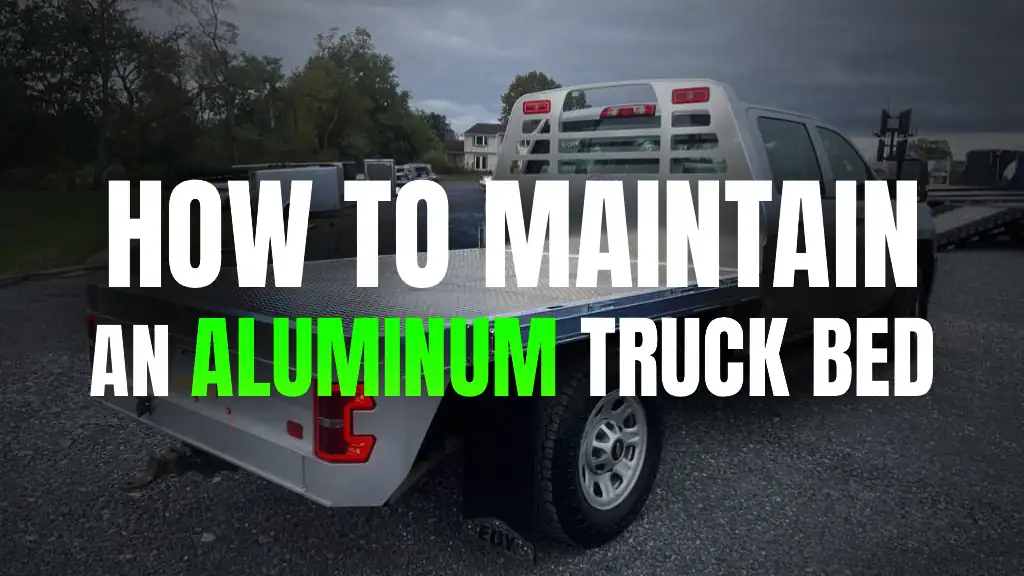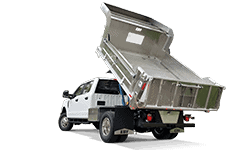Popular Searches:
Displaying top search terms based on the last 90 days.
Popular Searches:
Displaying top search terms based on the last 90 days.

Investing in an aluminum truck bed is a smart choice for durability, lighter weight, and long-term value. Aluminum resists rust better than steel and requires less heavy upkeep, but proper maintenance is still key to keeping it performing at its best.
So if you’re hauling tools, equipment, mulch, gravel, or construction materials, a little care goes a long way in extending the life of your truck bed and keeping your investment working efficiently for years.
Aluminum resists rust, but it’s not completely immune to wear. Road salt, fertilizer, manure, and other corrosive materials can pit the surface over time. A quick wash-down at the end of the day keeps buildup from sticking. Pressure washing regularly, especially on the undercarriage, corners, and hydraulic components, is a good way to remove hidden debris. It’s best to avoid harsh chemicals and stick to mild detergents designed for aluminum surfaces.
Aluminum is lighter than steel, but it flexes differently under heavy loads. Periodic inspections help catch small issues before they become big ones. Check welds for cracks, especially around stress points and hinge areas, and make sure bolts and fasteners are tight, as vibrations from hauling can loosen hardware over time. Hinges and latches should be moving freely and properly lubricated to avoid unnecessary strain.
The floor of your aluminum truck bed takes the brunt of the workload. Over time, constant impact from sharp or heavy loads can cause damage. Distributing loads evenly prevents concentrated wear, and using a bed liner or protective coating can reduce surface damage. When unloading, make sure heavy equipment doesn’t scrape the floor to maintain its integrity over time.
Many aluminum beds come with racks, tie-downs, toolbox mounts, or other accessories. These components can add convenience, but they also need attention. Inspect all attachments for loose hardware, rusted parts, or damaged surfaces.
Lubricate hinges, locks, and moving parts regularly, and replace any worn components immediately. Proper maintenance of attachments helps prevent unnecessary stress on the truck bed itself.
While aluminum doesn’t rust like steel, it can oxidize, leaving a dull or chalky surface. Polishing periodically restores shine and adds a protective layer, while applying wax or specialized sealants helps resist oxidation. Whenever possible, store the bed in a dry, covered area to minimize exposure and extend the life of the aluminum.
Maintenance routines should adapt to the time of year. In winter, rinse off salt and brine frequently to prevent pitting. During summer, apply a protective finish to guard against UV damage. For the off-season, grease moving parts, cover the bed, and store it out of the elements if possible.
For beds with hydraulic lifts or other moving mechanisms, regular maintenance ensures smooth operation. Check hydraulic fluid levels, inspect hoses for leaks or cracks, and cycle the system periodically even when not in use. Lubricate all moving parts according to the manufacturer’s recommendations to prevent strain and wear.

If you haul fertilizer, chemicals, salt, or other corrosive substances, take extra precautions. Clean spills immediately, rinse thoroughly, and consider using removable liners or mats to create a barrier between the bed surface and the materials. Even aluminum benefits from this extra layer of protection, especially when exposed to harsh substances over time.
An EBY aluminum truck bed is built tough to handle the daily grind while staying low-maintenance. Keep it performing at its best by cleaning it regularly, inspecting welds, maintaining the hydraulics, and protecting the floor from heavy wear. With just a little care, your EBY bed will deliver years of reliable service and make your workday easier.
We help Pennsylvania businesses find the right setup and keep it running strong. Stop by our lot or reach out today to see how an EBY aluminum truck bed can fit your workflow and make your jobs smoother.
It’s not required, but liners can extend the life of your floor, especially if you haul abrasive materials like stone, concrete, or scrap metal.
No, aluminum doesn’t rust like steel. However, it can corrode or oxidize if not cleaned regularly, especially when exposed to road salt or chemicals.
With consistent maintenance, many owners report their aluminum beds lasting 15–20+ years… often outlasting the truck itself.
Yes. Steel requires frequent painting and rust prevention. Aluminum only needs routine cleaning and inspections.